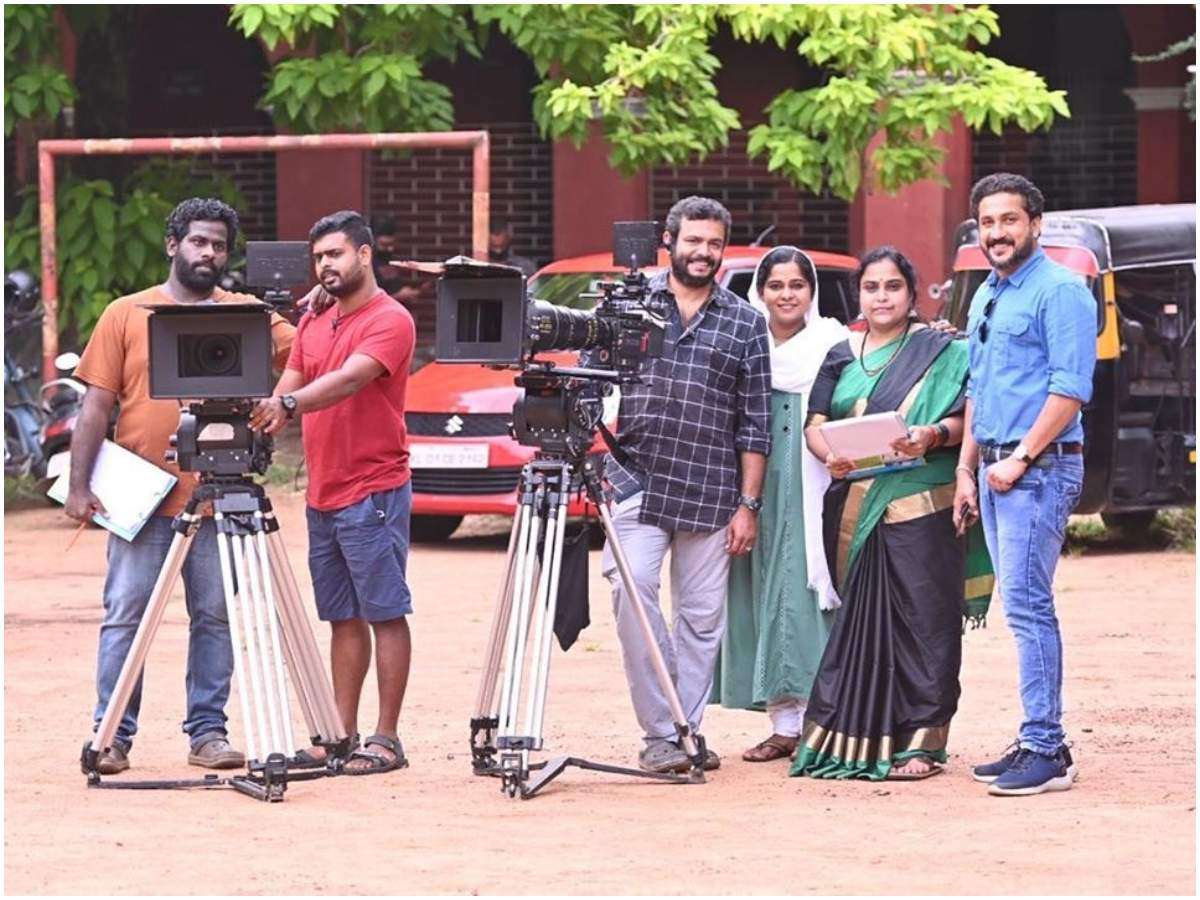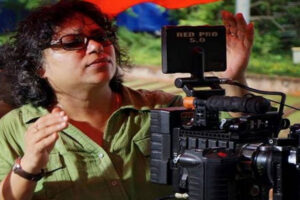Towards gender parity in Malayalee cinema

Mini I.G. with her team involved in post-production of film Divorce (Image Credits: Shibla Fara/Instagram)
Close on the heels of Chinese filmmaker Chloé Zhao becoming the first woman of colour to win an Oscar for best director, thousands of km away, in Kerala, two women filmmakers are set to make their own history, as agents of change in the male-dominated Malayalee cinema industry.
Nishiddho and Divorce, feature films by Tara Ramanujan and Mini I G respectively, are scheduled for theatrical release in Kerala during Onam in August. What is unique about the two films is that both have been fully funded by the Kerala government, in a first-ever inclusion initiative by a government in the global film industry.
“If the people and vaccines succeed in halting the rabid march of coronavirus soon, the fabled Onam celebrations in Kerala, curtailed last year by the pandemic, will mark a turning point in gender parity in Indian cinema this year,” says Vaishnavi Roy, a Kochi-based filmmaker.
After Ramanujan’s Nishiddho (forbidden) and Mini’s Divorce, the government is now scouting for other films to be funded under its women empowerment programme. “Kerala State Film Development Corporation (KSFDC) has already started the selection process for funding four more female-directed films this year,” Roy tells Media India Group.
“It is a revolutionary decision that can change the narrative and open corners that have always been closed for women,” says director Mini, who explores the personal and emotional struggles of six women in her film Divorce. The film is about the struggles of women after the break-up of their marriages and explains how these women from different social, geographical, and economic backgrounds make a life of their own after separating from their spouse.
“The initiative will give opportunities to under-represented women. All governments must start this programme to open the field for all, not just minorities, to express creativity,” says Ramanujan, whose film Nishiddho focuses on the lives of Kerala’s migrant workers, which she says is one of the largest sources of migrant labours in the Middle East. Shot in Ernakulam, Kolkata and on the outskirts of Madurai, Nishiddho tells the story of a bond between a migrant worker from West Bengal and a midwife from Tamil Nadu.
Though both female directors have made documentary films before, these will be their debut feature films. “The fact that these women have been doing amazing work but still continue to remain overshadowed by male filmmakers in Malayalee cinema, exposes the extremely difficult journey of women filmmakers to break the glass ceiling. The presence of women in the creative side of cinema is still rare in the industry. Their views and vision are still missing,” says Vijay Karun, another Kerala-based filmmaker. Currently assisting in a documentary film being shot in Thiruvananthapuram, Karun has been working as an assistant director for over three years now.
Pushback against patriarchy in cinema
He says that the Kerala government’s inclusion initiative is a pushback against the patriarchy in Malayalee cinema. “Any action by the state for equal opportunities is welcome,” he adds.
The KSFDC funding for female-directed films derives from budgetary allocation under the Kerala government’s women empowerment programme. Each KSFDC-produced film directed by a woman is eligible for INR 10 million, besides support for marketing and entering major film festivals. Nishiddho and Divorce have already been submitted for selection in upcoming film festivals like the well-known Cannes Film Festival in France and Locarno Film Festival in Switzerland.
When KSFDC invited scripts from female directors before the pandemic, it received over 60 entries. “Every person who came with a script, we respected their journey. It was also a process of mentoring. The idea itself is encouraging for so many to take up filmmaking,” says Fowzia Fathima, who was part of the five-member selection panel and is the co-founder of Indian Women Cinematographers Collective, a forum by and for craftswomen/ female technicians of the film industry based in India.
Fathima’s own debut film as a cinematographer was Mitr, My Friend (2002) directed by Asha Kelunni. It became the first Indian film to have an all-woman technical crew. “When you see a grant, you see a possibility. It is very motivating,” she adds.
Alarmingly fewer women behind the camera
A 2016 study on women in Indian cinema, conducted by United States-based Geena Davis Institute, says India – the world’s largest film-producing country – has only 9 pc female directors, 12 pc female writers and 15 pc female producers, less than the global average. The discrimination is not limited to behind the camera but continues on-screen as well where Indian films are nearly at the bottom, with only 25 pc of speaking parts belonging to women.
Report adds that while Indian films directed by women have dominated representation of India abroad at major festivals in the last decade, the number of female directors in the country is still alarmingly low.
In Kerala, too, the number of women directors is limited to a few names like Geetu Mohandas, Anjali Menon and Vidhu Vincent. “The entire system is looking at mostly men making films. When a woman wants to make a movie, the first notion is that it must be some art-house or low budget films,” says Fathima who is also an alumnus of the Film and Television Institute of India, Pune.
Filmmaker Roy says that aim of this initiative is to create an environment in which an artist’s benchmark is honesty and integrity irrespective of gender. “The initiative will give recognition to the filmmakers. This is the start of a huge change,” she says.
Fathima, who is also busy in the pre-production of her upcoming film in 2022, says that the inclusion initiative by Kerala will generate a ground for gender diversity in Indian cinema when the film industry realises that empowering women means creating an atmosphere for male and female directors as well as crew to work together without discrimination and abuse.
“Without such initiatives, stories like Nishiddho and Divorce would probably have never turned into a film and plan to come on the silver screen,” adds Fathima.











